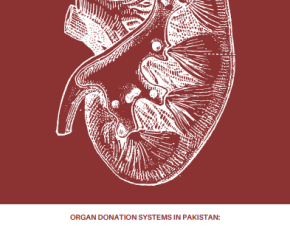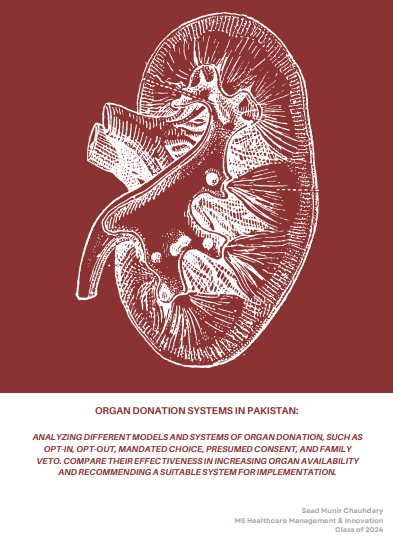The Health Policy on Different Organ Donations Modelling provides an in-depth analysis of organ donation systems in Pakistan, emphasizing the need for an effective system that balances the gap between the demand and supply of organs. The report delves into various models of organ donation, such as opt-in, opt-out, mandated choice, presumed consent, and family veto, assessing their efficacy in different global contexts and their potential applicability in Pakistan.
Key highlights of the report include:
Overview of Organ Donation:
The necessity for organ donation in Pakistan is established against the backdrop of a high fatality rate due to organ failure. The report emphasizes thegap between the demand for organ transplants and the limited supply of donors,attributing this to a lack of awareness and education about organ donation among thepopulation.
Organ Donation Models:
The report compares different organ donation systems,scrutinizing their effectiveness in increasing organ availability. It discusses the opt-insystem, highlighting its lower donation rates due to the requirement of active participation,and the opt-out system, which assumes consent unless explicitly denied. The mandated choice system, which requires individuals to decide about organ donation, and the family veto system, where family members can override the donor's decision, are also examined.
Ethical Considerations:
The report discusses the ethical dimensions of organ donation, such as autonomy, consent, and equitable access to healthcare. It stresses the need for ethical frameworks that balance individual rights with societal benefits while maintaining transparency and justice in organ donation systems.
Global Case Studies:
Insights from various countries, including Spain, Wales, Colombia, and Pakistan, are provided to illustrate the complexities and outcomes of different organ donation approaches. These examples underscore the importance of contextual nuances in evaluating and implementing organ donation systems.
Stakeholder Analysis:
The report identifies and analyzes the roles of various stakeholders in organ donation, including donors, families, medical professionals, regulatory bodies, the general public, religious and community leaders, the government, and the media. It underscores the interconnected roles these stakeholders play and the challenges they face in the organ donation process.
Policy Options and Recommendations:
Different policy options are assessed on their effectiveness, equity, and efficiency. The report suggests strategies like awareness campaigns, engaging religious leaders, legislative support, capacity building of authorities, and curbing illegal organ transplantation. Each option is evaluated for its feasibility and potential impact on increasing organ donations.
Implementation Framework:
A logical framework for organ donation in Pakistan isproposed, detailing goals, purposes, outputs, activities, and inputs necessary for effectiveimplementation. This framework aims to guide the systematic enhancement of organdonation rates and addresses barriers at various levels.















